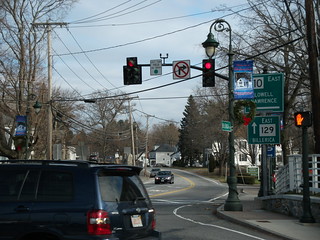 Congratulations to the town of Littleton and the Massachusetts Department of Transportation, both of which have earned recognition from Smart Growth America for their complete streets policies. First: Exactly what are complete streets policies?
Congratulations to the town of Littleton and the Massachusetts Department of Transportation, both of which have earned recognition from Smart Growth America for their complete streets policies. First: Exactly what are complete streets policies?
Complete Streets policies formalize a community’s goal to have streets that are safe for all types of users of all ages and abilities. Policies direct decision-makers to consistently fund, plan for, design, construct, operate and maintain community streets to accommodate all anticipated users, including people walking, bicycling, taking public transportation and driving cars as well as commercial vehicles.
Transportation planning should be about moving people, not just about moving vehicles. Considering driving has been in steep decline since 2004, peak sprawl happened 20 years ago, and driving sucks, it’s shocking how many of towns still focus their transportation planning almost exclusively around forcing people to buy a car and drive from place to place.
So why did Littleton earn recognition for the #2 complete streets policy in the entire country?
For its implementation policy, taking the idea of complete streets and turning that into concrete steps:
Town shall review and either revise or develop proposed revisions to all appropriate planning documents (master plans, open space and recreation plan, etc.), zoning and subdivision codes, laws, procedures, rules, regulations, guidelines, programs, and templates to integrate Complete Streets principles in all Street Projects on streets. A committee of relevant stakeholders designated by the Town Administrator will be created to implement this initiative.
The Town shall maintain a comprehensive inventory of pedestrian and bicycle facility infrastructure that will prioritize projects to eliminate gaps in the sidewalk and bikeway network.
The Town will reevaluate Capital Improvement Projects prioritization to encourage implementation of Complete Streets implementation.The Town will train pertinent town staff and decision-makers on the content of Complete Streets principles and best practices for implementing policy through workshops and other appropriate means.
The Town will utilize inter-department coordination to promote the most responsible and efficient use of resources for activities within the public way.
The Town will seek out appropriate sources of funding and grants for implementation of Complete Streets policies.
What about MassDOT? As if to prove how pragmatic they are, the folks at Smart Growth America recognized MassDOT for its exception policy, detailing the cases in which complete streets review might not be a good use of resources:
1C. MassDOT funded and or designed projects that fail to provide facilities for healthy transportation modes, as identified by the aforementioned reviews, shall require signoff by the Secretary and CEO of Transportation prior to advancing additional design work. For the Highway Division, this shall not apply to roadway facilities that already prohibit bicyclists and pedestrians, such as limited access highways, or Interstates.
1D. Projects under contract for construction, currently under bid review, or advertised for construction on the date of this policy adoption, do not need to undergo major modifications. However, each MassDOT Division shall submit a list of these projects to the Secretary and CEO of Transportation by October 1, 2013 highlighting healthy transportation design opportunities.
Read the full report or the executive summary.